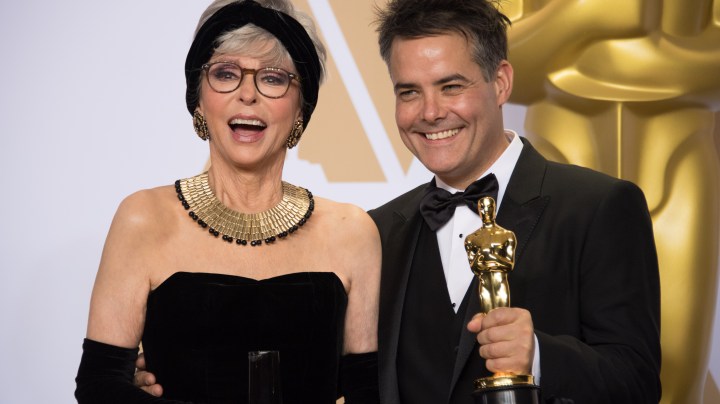‘A Fantastic Woman’ Director Sebastian Lelio After Oscar Win: Hire More Latinos

Rita Moreno and Sebastián Lelio, winner of the Oscar for Best foreign language film backstage during 90th Oscars on March 4, 2018. Photo by Michael Baker. Courtesy of A.M.P.A.S.
Wearing the same dress she wore over 50 years ago when she won her Oscar for Best Supporting Actress, Latina legend Rita Moreno was tasked with presenting the Academy Award for Best Foreign Language Film at this year’s ceremony. Her infectious laugh right before reading the winner’s name immediately announced good news for Latin America. Sebastián Lelio’s Una mujer fantástica (A Fantastic Woman) became the first movie ever to take home the award for Chile, making it only the second country in the region to have an Oscar in this category. (Argentina has won twice.)
Following his acceptance speech, for which he was joined on stage by actors Daniela Vega and Francisco Reyes, and producers Pablo and Juan de Dios Larraín, the director took questions press backstage in the interview room. There, Remezcla asked Lelio for his insight on how Hollywood can include more US-born Latinos in front and behind the camera, and though he admitted that he is not exactly knowledgeable in the subject, his thoughts were in the right direction.
“Include them in the stories, hire them for the roles, and just understand that stories come from so many different sources. I don’t live in the United States. I am not an expert of what’s going on here, but considering the amount of Hispanic population or Latino population, more stories should be out there. So I have the feeling that it’s a matter of time. Things seem to be changing, so I hope that’s the case,” he told us.
When another reporter inquired about which category should transgender actors be nominated in, Sebastián Lelio noted they should be placed in whatever gender they identify with: “If an actress like Daniela, who is a woman, wins, then she should win as a woman. I don’t think we should add a transgender category.“ It’s not a matter of demanding special treatment, he believes, but of simply giving trans people equal access, “I think we’re talking about freedom here, we’re not stretching opportunities; we’re opening them. And I hope this is not misunderstood, because I didn’t make the casting decision as a fascist decision, but as an act of freedom,” he added.

Though he knew he would never make the project without a transgender actress in the main role, he was surprised by how revolutionary that decision seemed to many people. “I never thought that it was going to be that important in the sense of how the film is perceived. I’ve been very surprised and happy to realize that that became one of the most important artistic gestures of the movie, and if it can contribute to keep opening the limits of what’s possible, keep expanding the horizons of our thinking, so welcome.”
Daniela Vega, the star of the film, transitioned at a young age in Chile, a country that still doesn’t have a gender identity law. She made history at the 90th Academy Awards by becoming the first openly transgender performer to present at the ceremony.